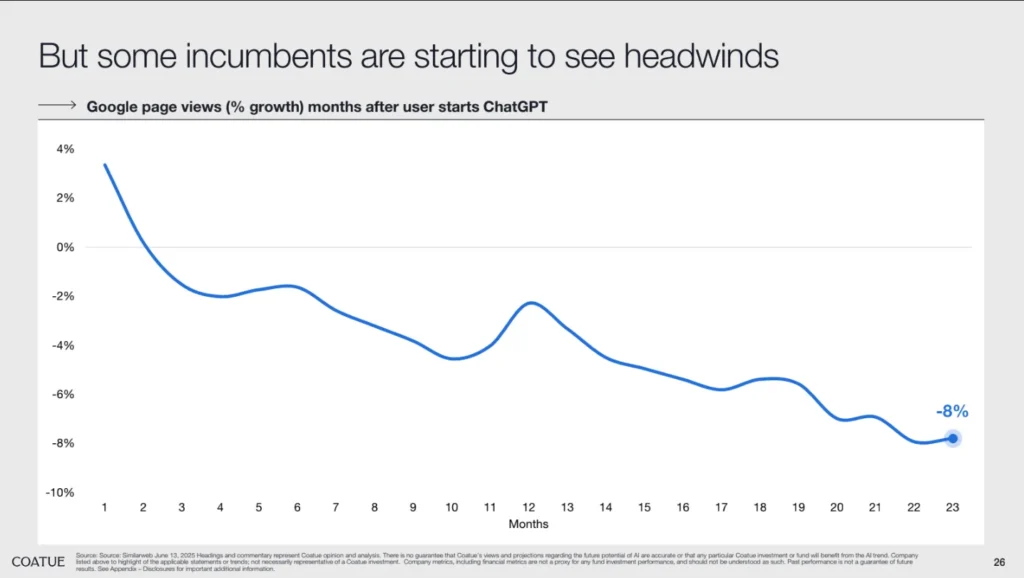Let’s not be too dramatic. Google isn’t going anywhere tomorrow. But the way people search is changing—fast. And the old guarantees? They’re starting to crack.
We’re witnessing a slow but significant power shift. For years, Google was the undisputed gateway to the internet. You wanted to know something? You Googled it. You needed to book a holiday, find a restaurant, solve a problem, win an argument—you Googled it. But now, thanks to changes in user behaviour and the rise of large language models (LLMs), that once-straightforward dominance is getting a little less certain.
Cracks in the surface
Here’s one stat to sit with: Heavy ChatGPT users have reduced their Google page views by around 8% year-on-year. That may not sound huge at first glance. But hold it up to the light. If ChatGPT’s 800 million users today become 3 billion in the next three years (entirely plausible), and if that 8% drop holds steady, Google’s core business could shrink by up to 20%. That’s tens of billions of dollars disappearing from its ad revenue. This isn’t a minor blip. It’s the start of a fundamental shift.

But it’s not just about LLMs.
Gen Z Don’t Google
Ask a teenager how they plan a holiday or look up a recipe. Their answer probably won’t involve a browser. TikTok has quietly become a new kind of search engine. Not in the traditional sense—but in a way that matters. It gives them what they want fast, in the format they like, from people they trust. For younger users, short-form video is where discovery happens. Google simply doesn’t play in that space.

The definition of “search” is shifting
We’re moving from typed queries to conversations. From keywords to context. From lists of links to direct answers. Tools like ChatGPT, Claude, Perplexity and others are starting to satisfy queries without sending users anywhere. That’s a huge deal for brands who’ve built strategies around visibility in traditional search.
The user behaviour shift is subtle but profound: people now expect insight, not just information. They don’t want ten blue links. They want one smart answer.
What does this mean for brands?
This is the part where marketers tend to panic. But don’t. The principles haven’t changed. What’s changing is the playing field. And that means rethinking how you show up.
Here are five things to start doing now:
1. Optimise for answers, not just rankings
If AI tools are summarising your content, make sure your content is clear, factual, and structured in a way that’s easy to parse. Bullet points. FAQs. Structured data. These aren’t just SEO tricks—they’re now essential for being picked up in LLM responses.
2. Experiment with conversational formats
Start creating content that mirrors how people speak and ask questions. Consider training your teams to write in a more human tone. Blog posts, help centres and even product pages should feel more like dialogue than textbook entries.
3. Think beyond the browser
TikTok, Reddit, even Discord—these platforms are where people go to discover, compare, and decide. Make sure your brand is present where the conversations are actually happening.
4. Embrace AI search platforms early
Explore how your brand shows up in ChatGPT, Perplexity, and other AI-driven interfaces. Use tools like ChatGPT plugins or content packs to ensure visibility in LLM-based environments.
5. Double down on brand distinctiveness
In a world of AI answers, brands that sound the same disappear into the background. You need a tone of voice and message that stands out. This is no time to be bland.
The Takeaway
Google isn’t dead. But it is different. And it’s no longer the only gatekeeper. The way people discover information is fragmenting. That means more opportunity, not less. But only for the brands that are paying attention.
The old search playbook won’t cut it much longer. Now’s the time to write a new one.
Cognitive Union is a progressive, boutique learning and performance consultancy. We work with forward-thinking businesses. Transforming their people. Shaping their culture. Helping them embrace change and take on the world. Find this blog useful? Sign up to our email newsletter (bottom of this page) where you can receive articles like this and other insights (not publically published), and you can also follow us on LinkedIn.

